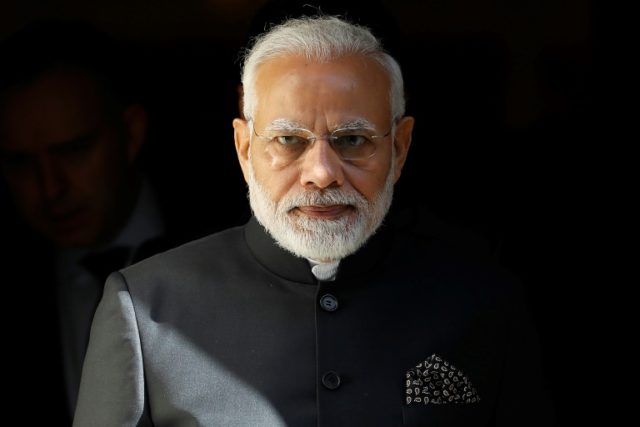Indian Prime Minister Narendra Modi’s administration is expected to tell Saudi Arabia’s top diplomat during his visit to New Delhi on Monday that the recent crackdown by the Sunni kingdom’s ally Pakistan against its domestic Islamic extremists remains “inadequate,” the Economic Times (ET) reports.
Last week, Pakistan announced that it had launched an intensified crackdown against domestic Islamic extremist groups, prompting the U.S. military to acknowledge that Islamabad had begun to take action against jihadis after years of multi-national pressure to do so.
India, however, dismissed the operations as a “sham,” ET notes.
The news outlet learned that the Modi administration is expected to convey a message to Saudi Arabia’s Minister of State for Foreign Affairs Adel Al-Jubeir during his visit to New Delhi on Monday — Islamabad must shut down its “terror factory” and take “irreversible” action against jihadis.
Referring to the message India is expected to convey, an unnamed Indian official told ET:
In 2004, the then President of Pakistan had made a solemn public commitment that they would not allow any territory under their control to be used for terrorist activity in any manner. But till today, however, Pakistan has failed to take any credible action against Jaish-E-Mohammad [JEM] and other terrorist organizations, which continue to operate from Pakistan. The presence of terrorist camps in Pakistan is a public knowledge within and outside Pakistan.
“The visiting Minister will be conveyed of the necessity of compelling Pakistan to move beyond mere words and to show credible, verifiable and sustained actions,” he added.
During his visit, the Saudi official is expected to discuss recent tensions between India and Pakistan over the disputed region of Kashmir that triggered concerns of an all-out war between the nuclear-armed rivals.
Last Thursday the Saudi minister met Pakistani Prime Minister Imran Khan.
India has reportedly rejected Saudi Arabia’s offer to serve as a mediator between India and Pakistan.
“Al-Jubeir who earlier wanted to visit India from Pakistan last week was politely advised to make a standalone visit to Delhi on the lines of Saudi Crown Prince Mohd Bin Salman who made an exception and returned back home from Islamabad before arriving in Delhi on February 20,” ET notes.
Militants from the Pakistan-based JEM group— designated as terrorist organization by the United States — claimed responsibility for a February 14 attack in India-administered Kashmir that left more than 40 security troops dead, marking the deadliest assault on Indian forces in decades.
The attack triggered reciprocal air operations by India and Pakistan — the two countries even engaged in a brief dogfight that triggered fears of war.
Pakistan denied India’s claim that Islamabad was involved in the JEM attack, saying it does not harbor any terrorist groups on its soil.
Washington, Kabul, and New Delhi have long accused Pakistan of serving as a sanctuary for terrorist groups known to carry out attacks in India and Afghanistan, including the likes of JEM, Lashkar-e-Taiba (LET), the Afghan Taliban, and its Haqqani Network allies.
Until recently, Islamabad had refused to stop harboring terrorists despite the decision by U.S. President Donald Trump’s administration in early 2018 to cancel hundreds of millions of dollars in aid to Islamabad.
Referring to Islamabad’s crackdown on terrorist last week, Reuters notes:
The move represents Pakistan’s biggest move against banned organizations in years and appears to be targeting Islamic welfare organizations that the United States says are a front for militant activities. …Previous large-scale crackdowns against anti-India militants have broadly been cosmetic, with the proscribed groups able to survive and continue operations.
Despite a 2003 ceasefire, India and Pakistan have engaged in periodic clashes that continue to this day along the border — Line of Control (LOC) — that separates their respective regions in Kashmir.
Pakistan, its ally China, and rival India all have competing claims to Kashmir. Islamabad has ceded control of some of its Kashmir lands to its partner Bejing while New Delhi disputes China’s claim to territory on its side of the LOC. China has largely stayed in the shadows of Kashmir territorial while providing Pakistan economic and military assistant to keep India in check.
India accuses Pakistan of supporting jihadis in Kashmir, a claim that Islamabad denies. Meanwhile, Islamabad accuses New Delhi of violently oppressing pro-Pakistan separatists who are fighting for independence or in favor of a merger with Pakistan. India denies the accusations.
Over 500 casualties in India-administered Kashmir alone made 2018 the bloodiest year in the region in nearly a decade. A rise in civilian deaths at the hands of Indian security forces compelled the United Nations last year to issue an unprecedented human rights report on Kashmir that New Delhi rejected as “fallacious, tendentious, and motivated.

COMMENTS
Please let us know if you're having issues with commenting.